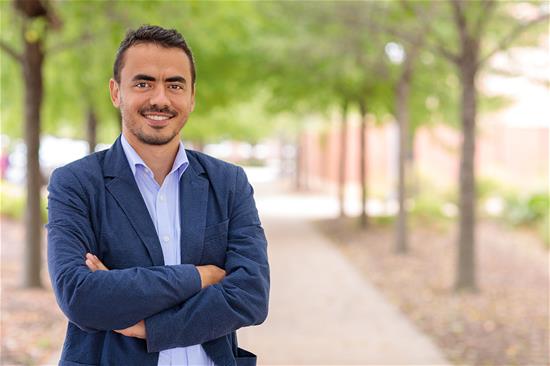Apr 1, 2020
Artificial intelligence can improve mammogram accuracy, research shows
Mehmet Eren Ahsen, an assistant professor who teaches business analytics at Gies College of Business, played a key role in a new game-changing study that combines artificial intelligence (AI) with radiologist readings to reduce false-positive mammogram results. Experts say these errors affect 9.5 percent of the 40 million women who receive routine exams in the US each year.
 Ahsen co-organized the Digital Mammography (DM) DREAM Challenge and was involved in the post-challenge analysis during his tenure at IBM and the Icahn School of Medicine at Mount Sinai (ISMMS). It is a community effort, born out of the White House’s Cancer Moonshot initiative, and its organizing committee includes IBM, ISMMS, Sage Bionetworks, Kaiser Permanente Washington, and the US Food and Drug Administration.
Ahsen co-organized the Digital Mammography (DM) DREAM Challenge and was involved in the post-challenge analysis during his tenure at IBM and the Icahn School of Medicine at Mount Sinai (ISMMS). It is a community effort, born out of the White House’s Cancer Moonshot initiative, and its organizing committee includes IBM, ISMMS, Sage Bionetworks, Kaiser Permanente Washington, and the US Food and Drug Administration.
As part of the post-challenge analysis, Ahsen developed an ensemble algorithm based on all the entries from the global crowd-sourced competition. It showed no single AI algorithm beat out community radiologists’ benchmarks. However, the ensemble algorithm can reduce the recall rate by 1.5%, which would result in 500+ million women annually who would not have to undergo an unnecessary diagnostic work-up.
“We found we could improve results with our collective intelligence. The ensemble learning available through the cloud-based model to data protects patient privacy yet gives us access to quality data. It’s an ingenious way of driving innovation, and we believe we’re the first to do it at this scale,” Ahsen said.
Ahsen sees business analytics playing an increasingly important role in patient care. He points to pilot research that can detect patient depression from a doctor’s notes or an algorithm that can predict the re-admit rate of a patient.
“AI can help medical professionals reduce workload and become more efficient and accurate in their interactions with patients. It’s not meant to replace them, but it can improve decision-making and reduce costs for both the patient and the medical institution,” said Ahsen.
It also can reduce bias.
“Algorithms can learn from data. In another study, we found that if someone has cancer in their family history, a doctor may order a biopsy even when it isn’t warranted. An algorithm can help them be cautious without causing unnecessary worry,” Ahsen said.
Ahsen has continued to work on several health-related studies since joining Gies last year. He earned dual bachelor’s degrees in mathematics and electrical and electronics engineering in Turkey and a PhD in biomedical engineering at the University of Texas at Dallas.
Ahsen has become one of the College’s data evangelists. He teaches a new required undergraduate course in business analytics, and he is co-organizing an in-class data competition, in a partnership with market research company IRI, which requires all 600 students enrolled in the class to work in teams to solve a real-world business analytics problem.
“Five years from now, you may not be able to find a good job without a strong understanding of business analytics. My job is to show my students how they can use analytics to solve any business challenge by learning from the lessons that the data tells us,” he said.
